Shady Oaks Case Study: Ethical Analysis for MAA250
VerifiedAdded on 2022/11/29
|8
|2010
|66
Case Study
AI Summary
This case study analysis examines ethical breaches and responsibilities within the Shady Oaks aged-care facility. The analysis focuses on the actions of Jane, the CEO, and their implications for the financial professionals, Avneet, Hamid, Spiro, and others. It explores ethical dilemmas related to workplace conduct, accounting practices, and adherence to professional codes of conduct, including issues of harassment, unlawful termination, and breaches of accounting standards. The analysis considers the consequences of different courses of action, applying ethical theories and principles to assess the best ethical choices. It also details the responsibilities of financial professionals, referencing accounting standards and principles, and highlighting the importance of maintaining integrity, objectivity, professional competence, confidentiality, and professional behavior. The analysis references the APES100 code of conduct and the threats to financial professionals and provides a comprehensive overview of the ethical challenges presented in the case study and the importance of maintaining ethical standards in financial practice.
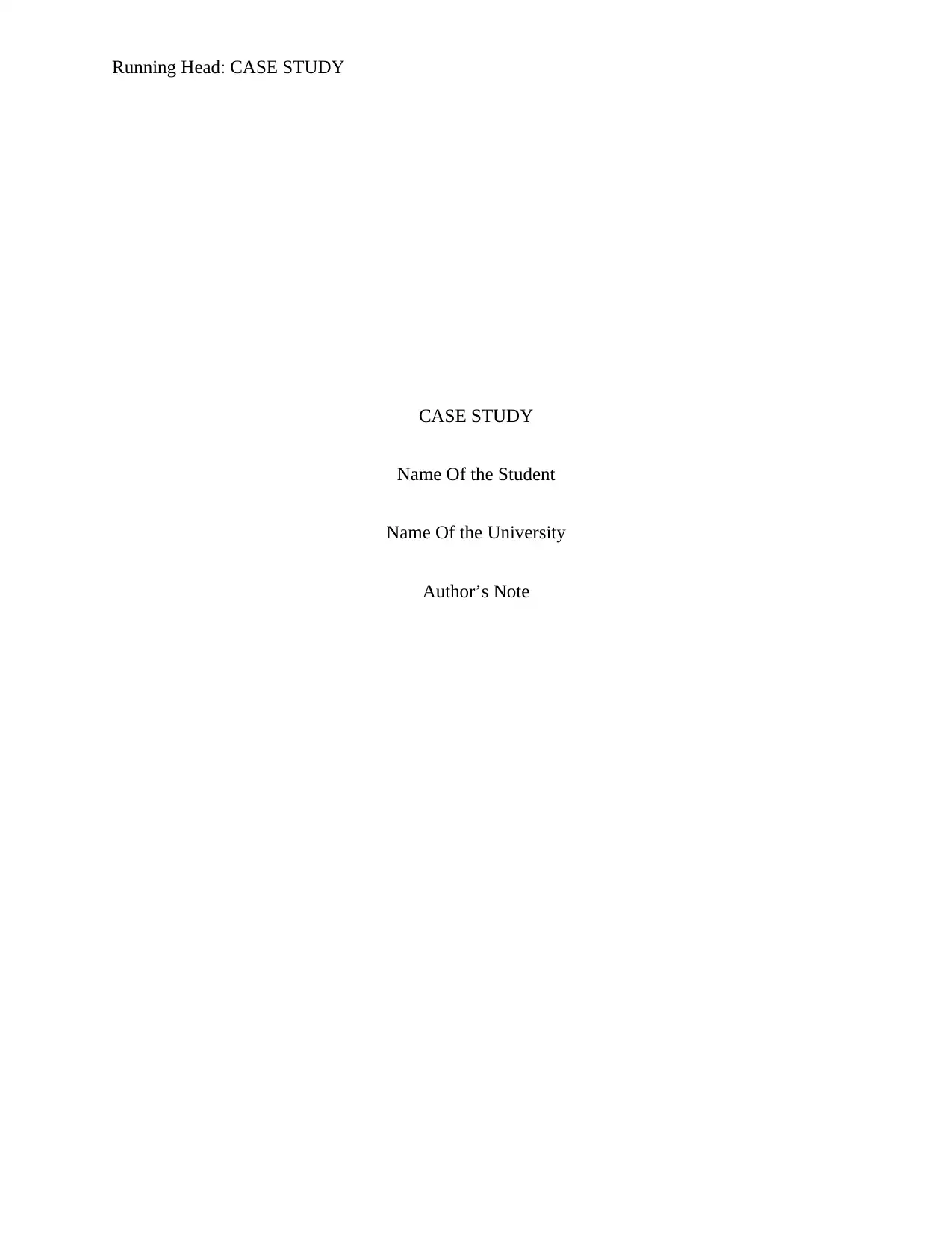
Running Head: CASE STUDY
CASE STUDY
Name Of the Student
Name Of the University
Author’s Note
CASE STUDY
Name Of the Student
Name Of the University
Author’s Note
Paraphrase This Document
Need a fresh take? Get an instant paraphrase of this document with our AI Paraphraser
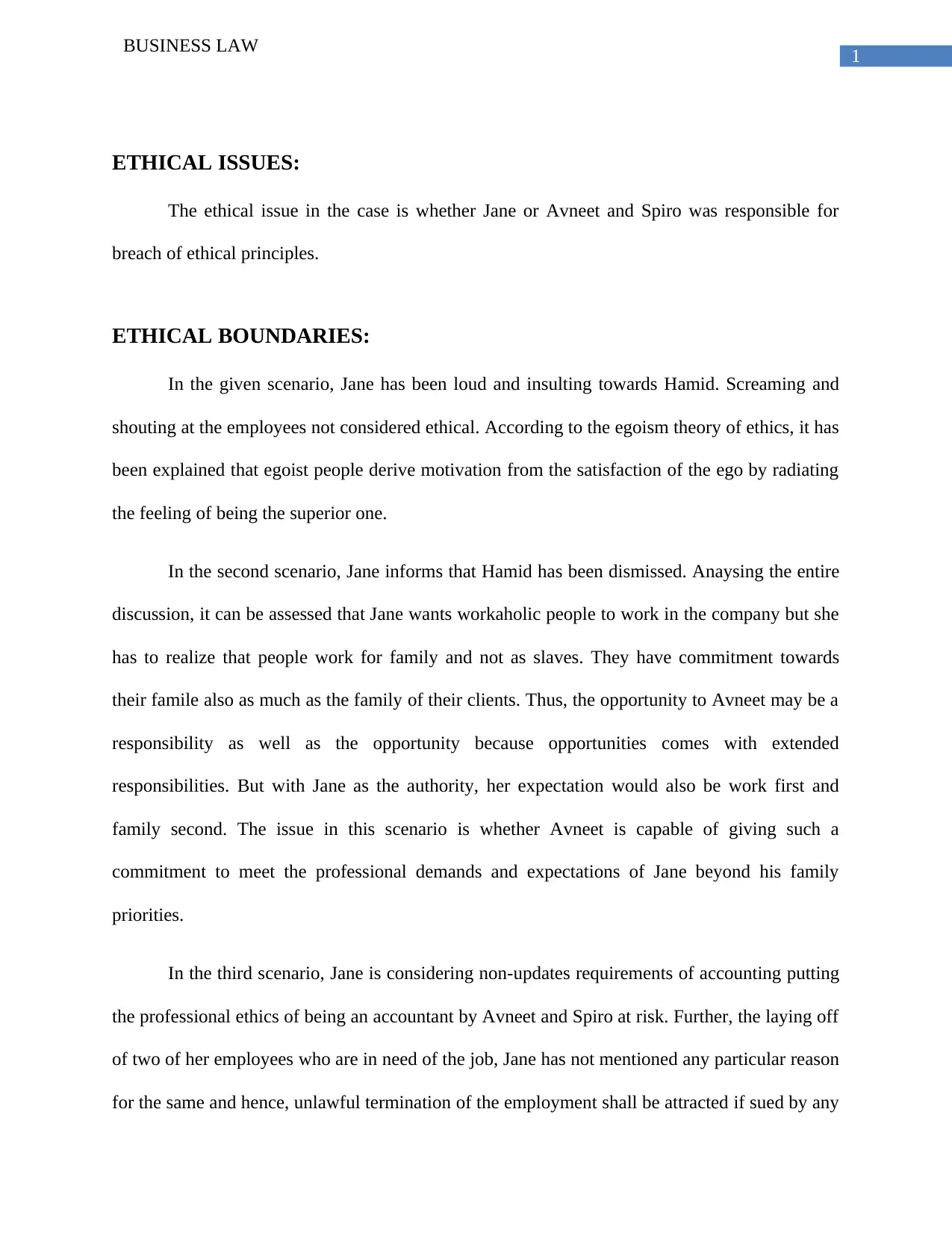
1
BUSINESS LAW
ETHICAL ISSUES:
The ethical issue in the case is whether Jane or Avneet and Spiro was responsible for
breach of ethical principles.
ETHICAL BOUNDARIES:
In the given scenario, Jane has been loud and insulting towards Hamid. Screaming and
shouting at the employees not considered ethical. According to the egoism theory of ethics, it has
been explained that egoist people derive motivation from the satisfaction of the ego by radiating
the feeling of being the superior one.
In the second scenario, Jane informs that Hamid has been dismissed. Anaysing the entire
discussion, it can be assessed that Jane wants workaholic people to work in the company but she
has to realize that people work for family and not as slaves. They have commitment towards
their famile also as much as the family of their clients. Thus, the opportunity to Avneet may be a
responsibility as well as the opportunity because opportunities comes with extended
responsibilities. But with Jane as the authority, her expectation would also be work first and
family second. The issue in this scenario is whether Avneet is capable of giving such a
commitment to meet the professional demands and expectations of Jane beyond his family
priorities.
In the third scenario, Jane is considering non-updates requirements of accounting putting
the professional ethics of being an accountant by Avneet and Spiro at risk. Further, the laying off
of two of her employees who are in need of the job, Jane has not mentioned any particular reason
for the same and hence, unlawful termination of the employment shall be attracted if sued by any
BUSINESS LAW
ETHICAL ISSUES:
The ethical issue in the case is whether Jane or Avneet and Spiro was responsible for
breach of ethical principles.
ETHICAL BOUNDARIES:
In the given scenario, Jane has been loud and insulting towards Hamid. Screaming and
shouting at the employees not considered ethical. According to the egoism theory of ethics, it has
been explained that egoist people derive motivation from the satisfaction of the ego by radiating
the feeling of being the superior one.
In the second scenario, Jane informs that Hamid has been dismissed. Anaysing the entire
discussion, it can be assessed that Jane wants workaholic people to work in the company but she
has to realize that people work for family and not as slaves. They have commitment towards
their famile also as much as the family of their clients. Thus, the opportunity to Avneet may be a
responsibility as well as the opportunity because opportunities comes with extended
responsibilities. But with Jane as the authority, her expectation would also be work first and
family second. The issue in this scenario is whether Avneet is capable of giving such a
commitment to meet the professional demands and expectations of Jane beyond his family
priorities.
In the third scenario, Jane is considering non-updates requirements of accounting putting
the professional ethics of being an accountant by Avneet and Spiro at risk. Further, the laying off
of two of her employees who are in need of the job, Jane has not mentioned any particular reason
for the same and hence, unlawful termination of the employment shall be attracted if sued by any
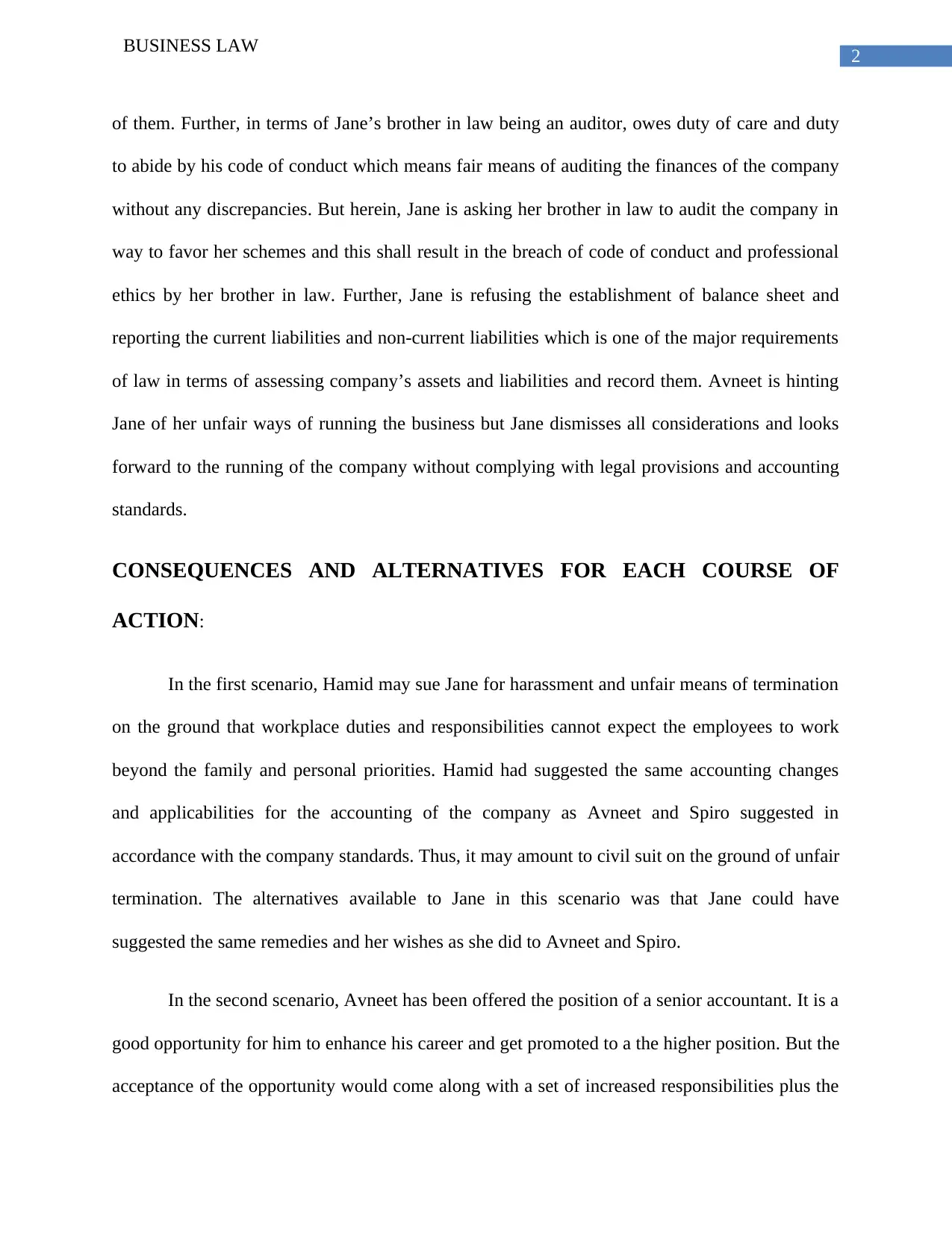
2
BUSINESS LAW
of them. Further, in terms of Jane’s brother in law being an auditor, owes duty of care and duty
to abide by his code of conduct which means fair means of auditing the finances of the company
without any discrepancies. But herein, Jane is asking her brother in law to audit the company in
way to favor her schemes and this shall result in the breach of code of conduct and professional
ethics by her brother in law. Further, Jane is refusing the establishment of balance sheet and
reporting the current liabilities and non-current liabilities which is one of the major requirements
of law in terms of assessing company’s assets and liabilities and record them. Avneet is hinting
Jane of her unfair ways of running the business but Jane dismisses all considerations and looks
forward to the running of the company without complying with legal provisions and accounting
standards.
CONSEQUENCES AND ALTERNATIVES FOR EACH COURSE OF
ACTION:
In the first scenario, Hamid may sue Jane for harassment and unfair means of termination
on the ground that workplace duties and responsibilities cannot expect the employees to work
beyond the family and personal priorities. Hamid had suggested the same accounting changes
and applicabilities for the accounting of the company as Avneet and Spiro suggested in
accordance with the company standards. Thus, it may amount to civil suit on the ground of unfair
termination. The alternatives available to Jane in this scenario was that Jane could have
suggested the same remedies and her wishes as she did to Avneet and Spiro.
In the second scenario, Avneet has been offered the position of a senior accountant. It is a
good opportunity for him to enhance his career and get promoted to a the higher position. But the
acceptance of the opportunity would come along with a set of increased responsibilities plus the
BUSINESS LAW
of them. Further, in terms of Jane’s brother in law being an auditor, owes duty of care and duty
to abide by his code of conduct which means fair means of auditing the finances of the company
without any discrepancies. But herein, Jane is asking her brother in law to audit the company in
way to favor her schemes and this shall result in the breach of code of conduct and professional
ethics by her brother in law. Further, Jane is refusing the establishment of balance sheet and
reporting the current liabilities and non-current liabilities which is one of the major requirements
of law in terms of assessing company’s assets and liabilities and record them. Avneet is hinting
Jane of her unfair ways of running the business but Jane dismisses all considerations and looks
forward to the running of the company without complying with legal provisions and accounting
standards.
CONSEQUENCES AND ALTERNATIVES FOR EACH COURSE OF
ACTION:
In the first scenario, Hamid may sue Jane for harassment and unfair means of termination
on the ground that workplace duties and responsibilities cannot expect the employees to work
beyond the family and personal priorities. Hamid had suggested the same accounting changes
and applicabilities for the accounting of the company as Avneet and Spiro suggested in
accordance with the company standards. Thus, it may amount to civil suit on the ground of unfair
termination. The alternatives available to Jane in this scenario was that Jane could have
suggested the same remedies and her wishes as she did to Avneet and Spiro.
In the second scenario, Avneet has been offered the position of a senior accountant. It is a
good opportunity for him to enhance his career and get promoted to a the higher position. But the
acceptance of the opportunity would come along with a set of increased responsibilities plus the
⊘ This is a preview!⊘
Do you want full access?
Subscribe today to unlock all pages.

Trusted by 1+ million students worldwide
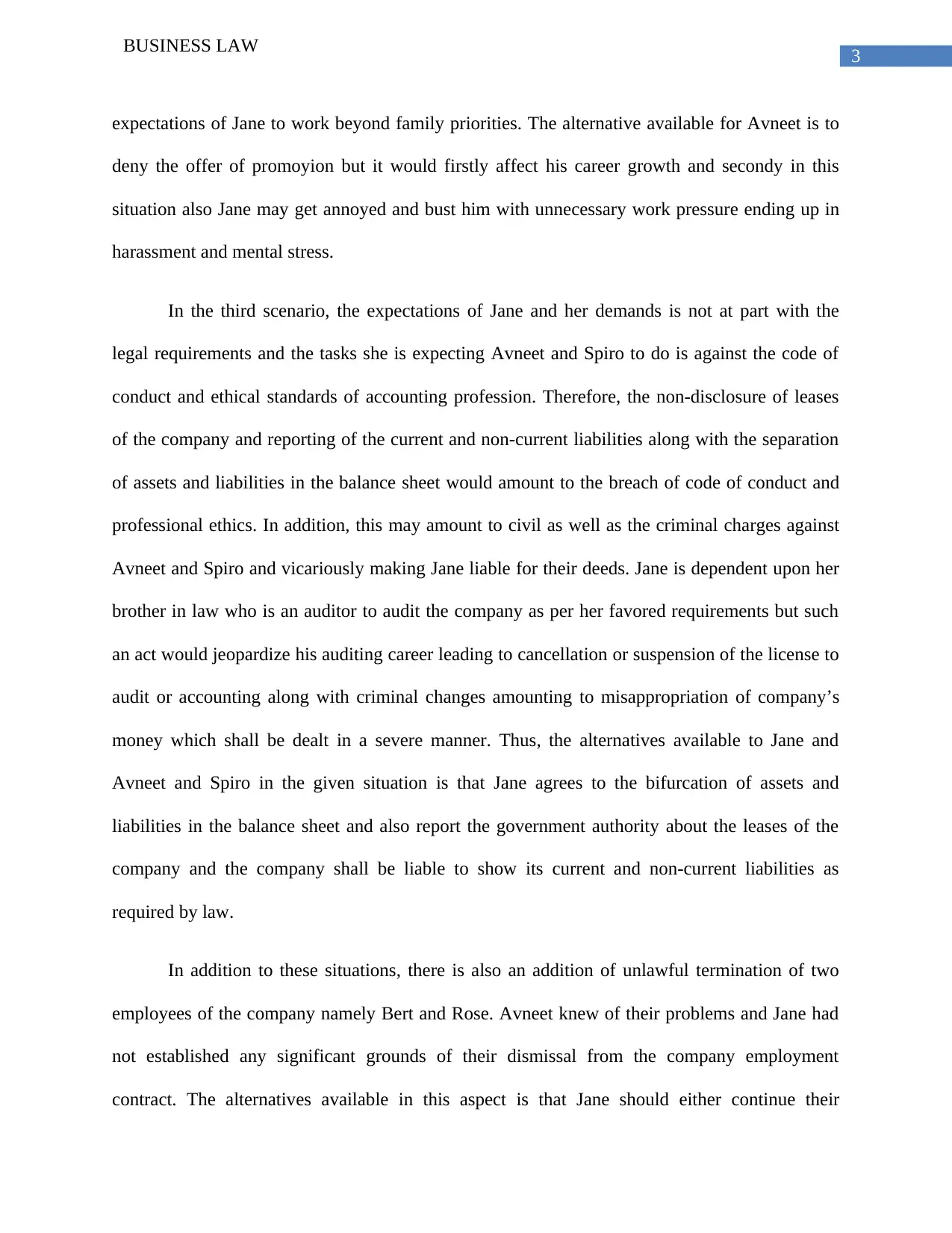
3
BUSINESS LAW
expectations of Jane to work beyond family priorities. The alternative available for Avneet is to
deny the offer of promoyion but it would firstly affect his career growth and secondy in this
situation also Jane may get annoyed and bust him with unnecessary work pressure ending up in
harassment and mental stress.
In the third scenario, the expectations of Jane and her demands is not at part with the
legal requirements and the tasks she is expecting Avneet and Spiro to do is against the code of
conduct and ethical standards of accounting profession. Therefore, the non-disclosure of leases
of the company and reporting of the current and non-current liabilities along with the separation
of assets and liabilities in the balance sheet would amount to the breach of code of conduct and
professional ethics. In addition, this may amount to civil as well as the criminal charges against
Avneet and Spiro and vicariously making Jane liable for their deeds. Jane is dependent upon her
brother in law who is an auditor to audit the company as per her favored requirements but such
an act would jeopardize his auditing career leading to cancellation or suspension of the license to
audit or accounting along with criminal changes amounting to misappropriation of company’s
money which shall be dealt in a severe manner. Thus, the alternatives available to Jane and
Avneet and Spiro in the given situation is that Jane agrees to the bifurcation of assets and
liabilities in the balance sheet and also report the government authority about the leases of the
company and the company shall be liable to show its current and non-current liabilities as
required by law.
In addition to these situations, there is also an addition of unlawful termination of two
employees of the company namely Bert and Rose. Avneet knew of their problems and Jane had
not established any significant grounds of their dismissal from the company employment
contract. The alternatives available in this aspect is that Jane should either continue their
BUSINESS LAW
expectations of Jane to work beyond family priorities. The alternative available for Avneet is to
deny the offer of promoyion but it would firstly affect his career growth and secondy in this
situation also Jane may get annoyed and bust him with unnecessary work pressure ending up in
harassment and mental stress.
In the third scenario, the expectations of Jane and her demands is not at part with the
legal requirements and the tasks she is expecting Avneet and Spiro to do is against the code of
conduct and ethical standards of accounting profession. Therefore, the non-disclosure of leases
of the company and reporting of the current and non-current liabilities along with the separation
of assets and liabilities in the balance sheet would amount to the breach of code of conduct and
professional ethics. In addition, this may amount to civil as well as the criminal charges against
Avneet and Spiro and vicariously making Jane liable for their deeds. Jane is dependent upon her
brother in law who is an auditor to audit the company as per her favored requirements but such
an act would jeopardize his auditing career leading to cancellation or suspension of the license to
audit or accounting along with criminal changes amounting to misappropriation of company’s
money which shall be dealt in a severe manner. Thus, the alternatives available to Jane and
Avneet and Spiro in the given situation is that Jane agrees to the bifurcation of assets and
liabilities in the balance sheet and also report the government authority about the leases of the
company and the company shall be liable to show its current and non-current liabilities as
required by law.
In addition to these situations, there is also an addition of unlawful termination of two
employees of the company namely Bert and Rose. Avneet knew of their problems and Jane had
not established any significant grounds of their dismissal from the company employment
contract. The alternatives available in this aspect is that Jane should either continue their
Paraphrase This Document
Need a fresh take? Get an instant paraphrase of this document with our AI Paraphraser
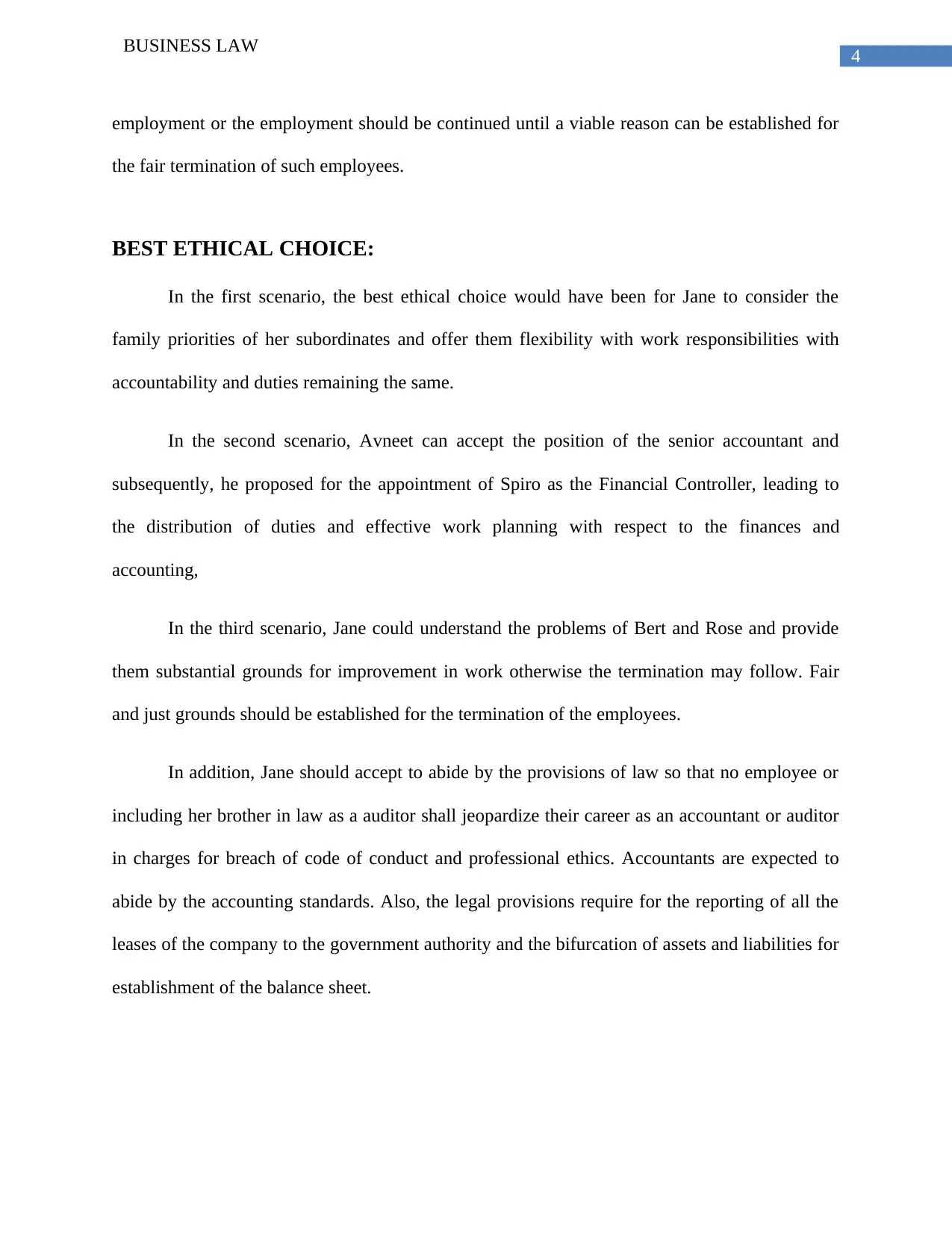
4
BUSINESS LAW
employment or the employment should be continued until a viable reason can be established for
the fair termination of such employees.
BEST ETHICAL CHOICE:
In the first scenario, the best ethical choice would have been for Jane to consider the
family priorities of her subordinates and offer them flexibility with work responsibilities with
accountability and duties remaining the same.
In the second scenario, Avneet can accept the position of the senior accountant and
subsequently, he proposed for the appointment of Spiro as the Financial Controller, leading to
the distribution of duties and effective work planning with respect to the finances and
accounting,
In the third scenario, Jane could understand the problems of Bert and Rose and provide
them substantial grounds for improvement in work otherwise the termination may follow. Fair
and just grounds should be established for the termination of the employees.
In addition, Jane should accept to abide by the provisions of law so that no employee or
including her brother in law as a auditor shall jeopardize their career as an accountant or auditor
in charges for breach of code of conduct and professional ethics. Accountants are expected to
abide by the accounting standards. Also, the legal provisions require for the reporting of all the
leases of the company to the government authority and the bifurcation of assets and liabilities for
establishment of the balance sheet.
BUSINESS LAW
employment or the employment should be continued until a viable reason can be established for
the fair termination of such employees.
BEST ETHICAL CHOICE:
In the first scenario, the best ethical choice would have been for Jane to consider the
family priorities of her subordinates and offer them flexibility with work responsibilities with
accountability and duties remaining the same.
In the second scenario, Avneet can accept the position of the senior accountant and
subsequently, he proposed for the appointment of Spiro as the Financial Controller, leading to
the distribution of duties and effective work planning with respect to the finances and
accounting,
In the third scenario, Jane could understand the problems of Bert and Rose and provide
them substantial grounds for improvement in work otherwise the termination may follow. Fair
and just grounds should be established for the termination of the employees.
In addition, Jane should accept to abide by the provisions of law so that no employee or
including her brother in law as a auditor shall jeopardize their career as an accountant or auditor
in charges for breach of code of conduct and professional ethics. Accountants are expected to
abide by the accounting standards. Also, the legal provisions require for the reporting of all the
leases of the company to the government authority and the bifurcation of assets and liabilities for
establishment of the balance sheet.
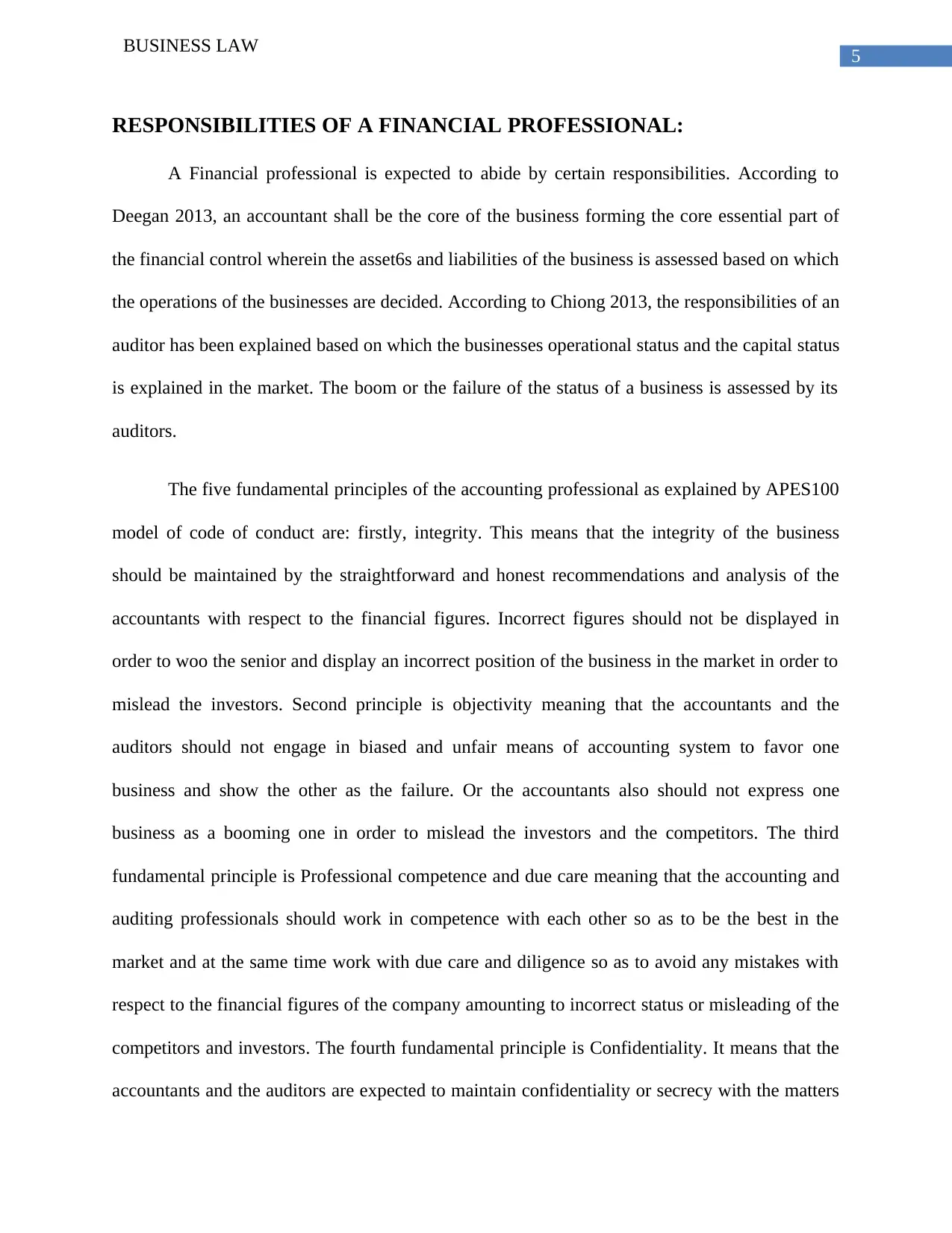
5
BUSINESS LAW
RESPONSIBILITIES OF A FINANCIAL PROFESSIONAL:
A Financial professional is expected to abide by certain responsibilities. According to
Deegan 2013, an accountant shall be the core of the business forming the core essential part of
the financial control wherein the asset6s and liabilities of the business is assessed based on which
the operations of the businesses are decided. According to Chiong 2013, the responsibilities of an
auditor has been explained based on which the businesses operational status and the capital status
is explained in the market. The boom or the failure of the status of a business is assessed by its
auditors.
The five fundamental principles of the accounting professional as explained by APES100
model of code of conduct are: firstly, integrity. This means that the integrity of the business
should be maintained by the straightforward and honest recommendations and analysis of the
accountants with respect to the financial figures. Incorrect figures should not be displayed in
order to woo the senior and display an incorrect position of the business in the market in order to
mislead the investors. Second principle is objectivity meaning that the accountants and the
auditors should not engage in biased and unfair means of accounting system to favor one
business and show the other as the failure. Or the accountants also should not express one
business as a booming one in order to mislead the investors and the competitors. The third
fundamental principle is Professional competence and due care meaning that the accounting and
auditing professionals should work in competence with each other so as to be the best in the
market and at the same time work with due care and diligence so as to avoid any mistakes with
respect to the financial figures of the company amounting to incorrect status or misleading of the
competitors and investors. The fourth fundamental principle is Confidentiality. It means that the
accountants and the auditors are expected to maintain confidentiality or secrecy with the matters
BUSINESS LAW
RESPONSIBILITIES OF A FINANCIAL PROFESSIONAL:
A Financial professional is expected to abide by certain responsibilities. According to
Deegan 2013, an accountant shall be the core of the business forming the core essential part of
the financial control wherein the asset6s and liabilities of the business is assessed based on which
the operations of the businesses are decided. According to Chiong 2013, the responsibilities of an
auditor has been explained based on which the businesses operational status and the capital status
is explained in the market. The boom or the failure of the status of a business is assessed by its
auditors.
The five fundamental principles of the accounting professional as explained by APES100
model of code of conduct are: firstly, integrity. This means that the integrity of the business
should be maintained by the straightforward and honest recommendations and analysis of the
accountants with respect to the financial figures. Incorrect figures should not be displayed in
order to woo the senior and display an incorrect position of the business in the market in order to
mislead the investors. Second principle is objectivity meaning that the accountants and the
auditors should not engage in biased and unfair means of accounting system to favor one
business and show the other as the failure. Or the accountants also should not express one
business as a booming one in order to mislead the investors and the competitors. The third
fundamental principle is Professional competence and due care meaning that the accounting and
auditing professionals should work in competence with each other so as to be the best in the
market and at the same time work with due care and diligence so as to avoid any mistakes with
respect to the financial figures of the company amounting to incorrect status or misleading of the
competitors and investors. The fourth fundamental principle is Confidentiality. It means that the
accountants and the auditors are expected to maintain confidentiality or secrecy with the matters
⊘ This is a preview!⊘
Do you want full access?
Subscribe today to unlock all pages.

Trusted by 1+ million students worldwide
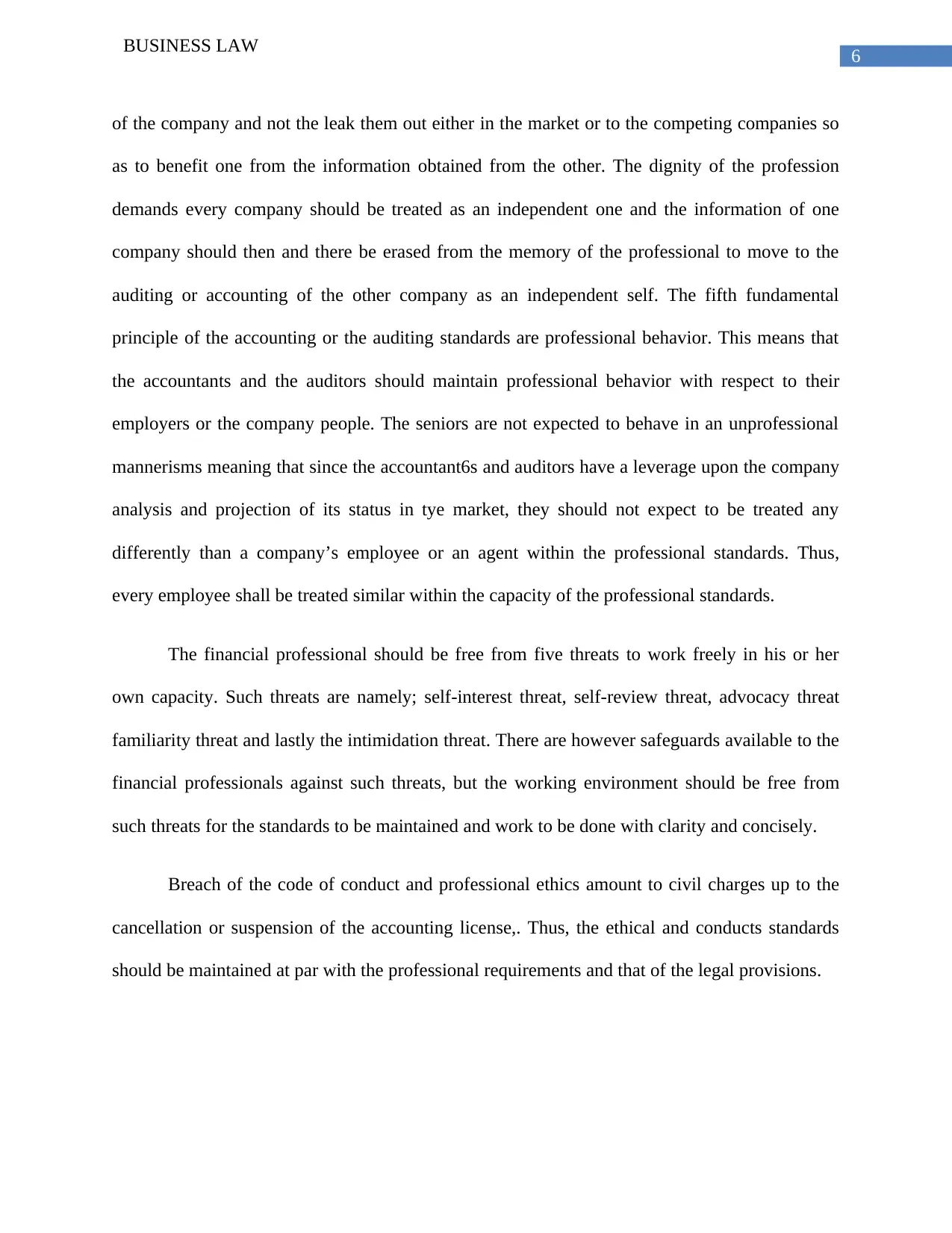
6
BUSINESS LAW
of the company and not the leak them out either in the market or to the competing companies so
as to benefit one from the information obtained from the other. The dignity of the profession
demands every company should be treated as an independent one and the information of one
company should then and there be erased from the memory of the professional to move to the
auditing or accounting of the other company as an independent self. The fifth fundamental
principle of the accounting or the auditing standards are professional behavior. This means that
the accountants and the auditors should maintain professional behavior with respect to their
employers or the company people. The seniors are not expected to behave in an unprofessional
mannerisms meaning that since the accountant6s and auditors have a leverage upon the company
analysis and projection of its status in tye market, they should not expect to be treated any
differently than a company’s employee or an agent within the professional standards. Thus,
every employee shall be treated similar within the capacity of the professional standards.
The financial professional should be free from five threats to work freely in his or her
own capacity. Such threats are namely; self-interest threat, self-review threat, advocacy threat
familiarity threat and lastly the intimidation threat. There are however safeguards available to the
financial professionals against such threats, but the working environment should be free from
such threats for the standards to be maintained and work to be done with clarity and concisely.
Breach of the code of conduct and professional ethics amount to civil charges up to the
cancellation or suspension of the accounting license,. Thus, the ethical and conducts standards
should be maintained at par with the professional requirements and that of the legal provisions.
BUSINESS LAW
of the company and not the leak them out either in the market or to the competing companies so
as to benefit one from the information obtained from the other. The dignity of the profession
demands every company should be treated as an independent one and the information of one
company should then and there be erased from the memory of the professional to move to the
auditing or accounting of the other company as an independent self. The fifth fundamental
principle of the accounting or the auditing standards are professional behavior. This means that
the accountants and the auditors should maintain professional behavior with respect to their
employers or the company people. The seniors are not expected to behave in an unprofessional
mannerisms meaning that since the accountant6s and auditors have a leverage upon the company
analysis and projection of its status in tye market, they should not expect to be treated any
differently than a company’s employee or an agent within the professional standards. Thus,
every employee shall be treated similar within the capacity of the professional standards.
The financial professional should be free from five threats to work freely in his or her
own capacity. Such threats are namely; self-interest threat, self-review threat, advocacy threat
familiarity threat and lastly the intimidation threat. There are however safeguards available to the
financial professionals against such threats, but the working environment should be free from
such threats for the standards to be maintained and work to be done with clarity and concisely.
Breach of the code of conduct and professional ethics amount to civil charges up to the
cancellation or suspension of the accounting license,. Thus, the ethical and conducts standards
should be maintained at par with the professional requirements and that of the legal provisions.
Paraphrase This Document
Need a fresh take? Get an instant paraphrase of this document with our AI Paraphraser
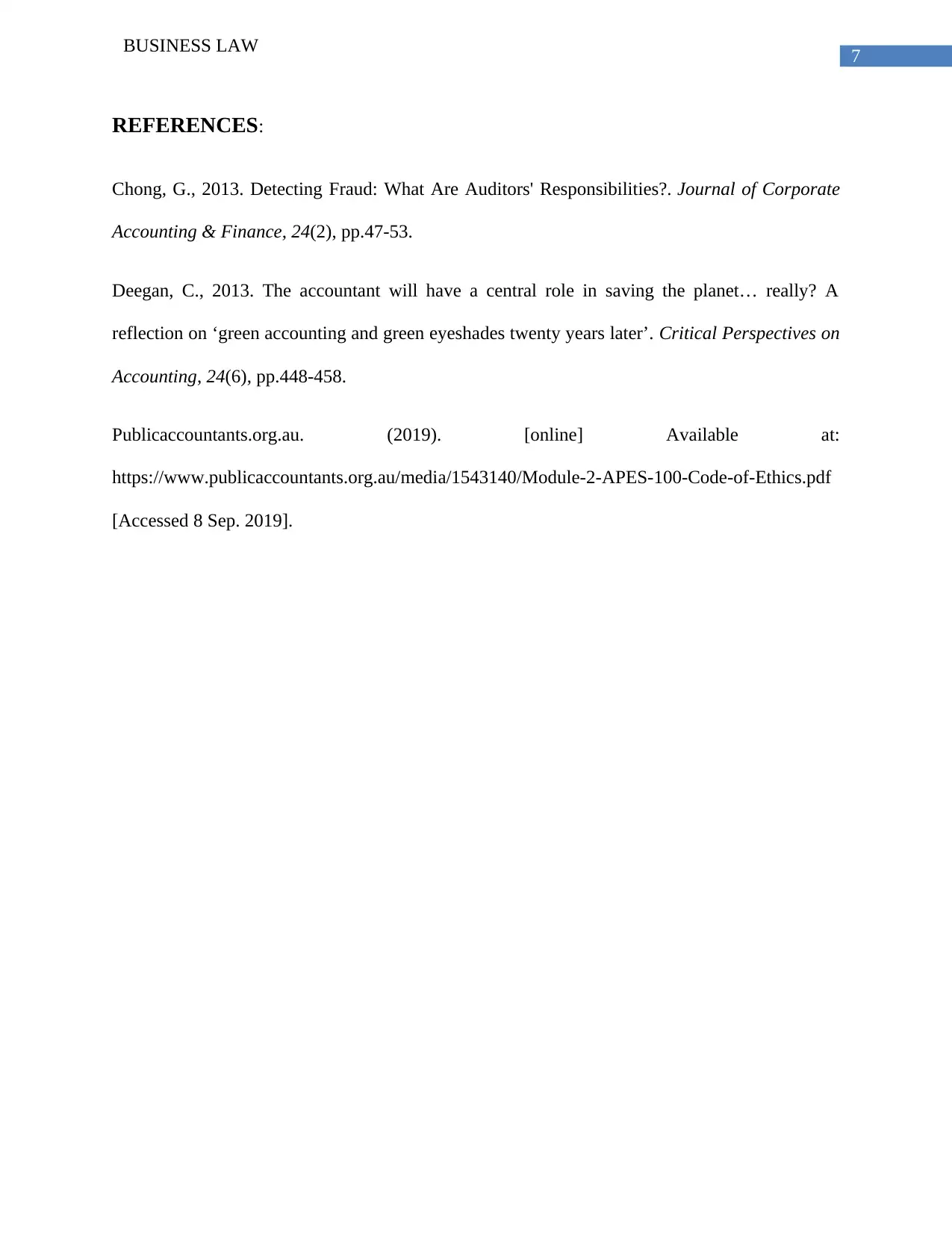
7
BUSINESS LAW
REFERENCES:
Chong, G., 2013. Detecting Fraud: What Are Auditors' Responsibilities?. Journal of Corporate
Accounting & Finance, 24(2), pp.47-53.
Deegan, C., 2013. The accountant will have a central role in saving the planet… really? A
reflection on ‘green accounting and green eyeshades twenty years later’. Critical Perspectives on
Accounting, 24(6), pp.448-458.
Publicaccountants.org.au. (2019). [online] Available at:
https://www.publicaccountants.org.au/media/1543140/Module-2-APES-100-Code-of-Ethics.pdf
[Accessed 8 Sep. 2019].
BUSINESS LAW
REFERENCES:
Chong, G., 2013. Detecting Fraud: What Are Auditors' Responsibilities?. Journal of Corporate
Accounting & Finance, 24(2), pp.47-53.
Deegan, C., 2013. The accountant will have a central role in saving the planet… really? A
reflection on ‘green accounting and green eyeshades twenty years later’. Critical Perspectives on
Accounting, 24(6), pp.448-458.
Publicaccountants.org.au. (2019). [online] Available at:
https://www.publicaccountants.org.au/media/1543140/Module-2-APES-100-Code-of-Ethics.pdf
[Accessed 8 Sep. 2019].
1 out of 8
Your All-in-One AI-Powered Toolkit for Academic Success.
+13062052269
info@desklib.com
Available 24*7 on WhatsApp / Email
![[object Object]](/_next/static/media/star-bottom.7253800d.svg)
Unlock your academic potential
Copyright © 2020–2026 A2Z Services. All Rights Reserved. Developed and managed by ZUCOL.